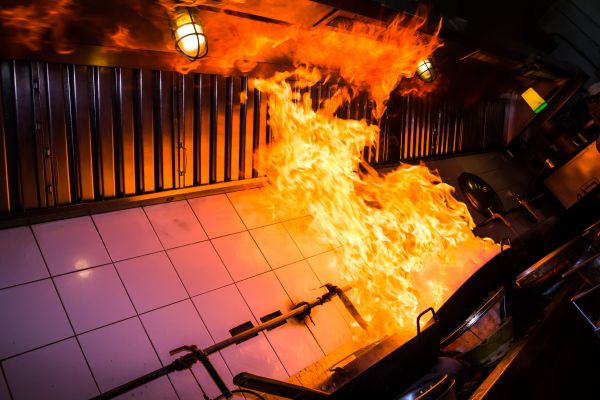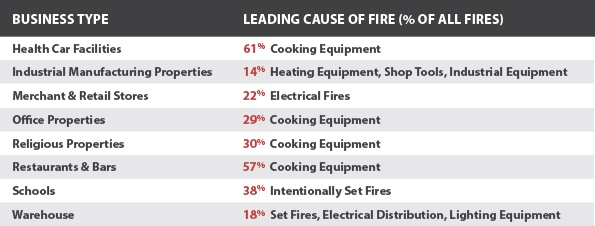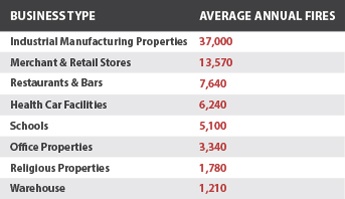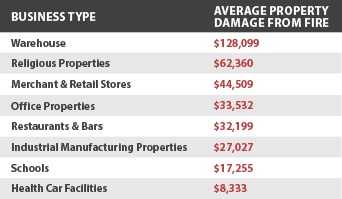
HOW MUCH DOES A FIRE COST A BUSINESS?
How much damage does a fire in a business cause? What are the main causes of business fires? When is a fire in a business most likely to happen? At Koorsen, we did some research to identify the costs and causes of business' fires in America. We also identified some simple tips to follow to reduce the risks of a fire happening at your business.
DIFFERENT BUSINESSES. DIFFERENT FIRE RISKS.
There are many different types of businesses and business properties. When looking at the data from the NFPA, they broke down businesses into 8 types. These were:
- Office Properties
- Merchant & Retail Stores
- Restaurants & Bars
- Religious Properties
- Schools
- Health Care Facilities
- Industrial or Manufacturing Properties
- Warehouses
Some of these business types have similarities while others are vastly different. One similarity found was cooking equipment being the leading cause of fires in several of the business types. These included office properties, restaurants & bars, religious properties, and health care facilities. Cooking equipment can include a small microwave or a large appliance, like an oven or deep fryer.
One factor that stood out for two of the business types was intentionally set fires. Intentionally set fires were the leading cause of fires for schools and warehouses. They accounted for an astounding 38% of all fires in schools.
The one business that was different from the rest in regards to the leading cause of fires was industrial and manufacturing businesses. The leading causes were heating equipment, shop tools, and industrial equipment, with each accounting for 14% of all fires.
 Source: http://www.nfpa.org/news-and-research/fire-statistics-and-reports/fire-statistics/fires-by-property-type
Source: http://www.nfpa.org/news-and-research/fire-statistics-and-reports/fire-statistics/fires-by-property-type
Looking at the data above, you can see that there is a high risk of fires from cooking equipment in restaurants and health care facilities. Almost half of the health care facility fires happened at nursing homes where cooking equipment is more widely used. While cooking equipment fires were more common in these two business types, the cost in damages were usually minimal. This was mostly due to a person or persons being present when the fires happened. Kitchen fire suppression and fire sprinkler systems also helped reduce the cost in damages when present and activated.
WHICH BUSINESSES SUFFER THE MOST FIRES?
A majority of fires happen at industrial and manufacturing properties. Fire departments responded to 37,000 fires at industrial or manufacturing properties annually. These fires were mostly due to mechanical failures and malfunctions of equipment.
Coming in at a distant second for annual number of fires were merchant and retail stores with 13,570. Electrical failure or malfunction was the most common cause of fires for these storefront businesses. Not surprising, while fires were most common during regular business hours, property damage was greater during the night when most businesses were closed. These findings underscore the importance of having properly maintained and working fire safety and life safety equipment.

Source: http://www.nfpa.org/news-and-research/fire-statistics-and-reports/fire-statistics/fires-by-property-type
HOW MUCH DAMAGE CAN A FIRE CAUSE?
While fires in warehouses occur less often, they do incur the highest average property damage costs. A single warehouse fire causes an average of $128,099 in property damage. That is significantly higher than a health care facility fire, which causes an average of $8,333 in damage.
The businesses with the highest property damage costs from fires tended to be businesses with larger concentrations of products like retail stores or warehouses. The one anomaly was fires in religious properties.
The property damage costs from fires in religious properties was high due mainly to the properties being lightly occupied during the week. It is important to note, that when sprinklers were present in religious properties, the average cost of property damage went down 73%.

REDUCING THE RISK OF FIRE IN BUSINESSES
Most fires that happen in businesses could have been prevented. Below are a few steps you can take to greatly reduce the risk of fire in your business.
- Training & Education
Your employees play an essential role to reducing the risks of fire. By educating them on your emergency action plan, training them on how to operate your fire extinguishers, and teaching them how to identify potential fire hazards, your employees can greatly reduce the risks and limit the potential damages of fire.
- Regular Maintenance & Inspections
Does your business have a fire sprinkler system? When was the last time it was activated? When was the last time it was inspected and tested? Without regular maintenance and inspections of your entire life safety system, you are putting your property and your employees at risk.
Your fire and safety systems are subject to national, state and local codes which is why it is imperative to work with professionals, like Koorsen, who have the knowledge and expertise to ensure your systems are compliant and fully-operable.
- Identify the Risks
As we’ve identified earlier, every business type is different when it comes to fire risks. It is important to identify your business’s potential fire hazards and take precautions to reduce those risks. This could include identifying flammable liquids and ensuring they are handled and stored properly. For restaurants, you want to make sure your employees are aware of the risks of fire around the cooking equipment and know what to do if a fire should break out. For nursing homes and other businesses where cooking equipment is a major cause of fires, you want to make sure to never leave the cooking unattended and that the kitchen is protected by regularly inspected and maintained kitchen fire suppression systems.
- Proper Equipment
If a fire does happen in your business, you want to be sure you have the proper equipment to reduce the damages to property and life. This can include fire extinguishers, fire sprinklers, fire suppression systems, fire alarms, emergency lighting, exit signs, and more. A life safety expert can provide an on-site hazard analysis to identify potential risks and steps that you can take to reduce them through training or system upgrades.
For a free on-site hazard analysis or to learn more about Koorsen’s fire and security services, contact a Koorsen associate today.


